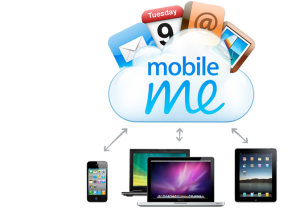There has been a lot of speculation about what Apple will do with its MobileMe service and while the majority of the rumors claim it will be based on cloud storage, I don’t think anyone has quite nailed it yet.
[ad#Google Adsense 300×250 in story]For instance, reports claim that the new device would give users access to their iTunes libraries and sync services. However, to date, nobody has been able to detail exactly how this would happen.
Is Apple going to give us all 100GB of cloud storage to host our music, backups and sync data? That seems a bit much to me. Here’s what I think will happen with Apple’s new MobileMe service.
Instead of trying to provide everyone with cloud storage, I believe Apple will use MobileMe as the brain of the cloud service. The actual storage will be on our individual machines. In effect, in the cloud.
Look at it like this. I have three computers, an iPhone and an iPad. With the new MobileMe, all of my files on every device I have registered with MobileMe will be accessible to each other.
 The Home folder on your Mac Pro may be 300GB and your iPhone only has 32GB, but it doesn’t matter because you are only browsing the files.
The Home folder on your Mac Pro may be 300GB and your iPhone only has 32GB, but it doesn’t matter because you are only browsing the files.
If I’m away from my house and I want to listen to a song from my home iTunes account, I can do that. Every song in my library will be listed on my iPhone.
Here’s the thing — those songs won’t actually be on my iPhone until I tap to play them. As soon as I tap to play, it will download to my phone. You can scroll through your music library and choose something else and it will download and play.
In effect, what Apple’s doing is setting up a streaming service that you host. By using advanced caching and MobileMe as the brain behind the operation, you will always have access to your media.
I also believe that MobileMe will be more than about media. You will also be able to share and sync files and documents in much the same way. If there is a document on your home system that you need, it will always be available to you. Tap on it, and it downloads to your iPhone or iPad.
Documents that you download will be automatically synced with all of your other machines, so you don’t need to worry about emailing yourself revisions. Smart syncing will only change the exact bits that changed — it won’t resync the entire document. This could also mean that documents could be changed from multiple locations because it wouldn’t overwrite existing changes.
This could be the end of iDisk as we know it because we have our own iDisk and are using own Macs to build it.
I believe MobileMe as I’ve described it here will be compatible with Macs, iPhone, iPad, iPod touch and Windows. Basically, personal computers and iOS devices.
Of course, this type of service would also sync all of your contacts, calendars and other data that we’ve become accustomed to syncing on our devices.
There is talk about MobileMe being free when this new service launches. I’m not so sure about that. We may see parts of MobileMe be free, but there still could be a charge for the main parts of the service.
